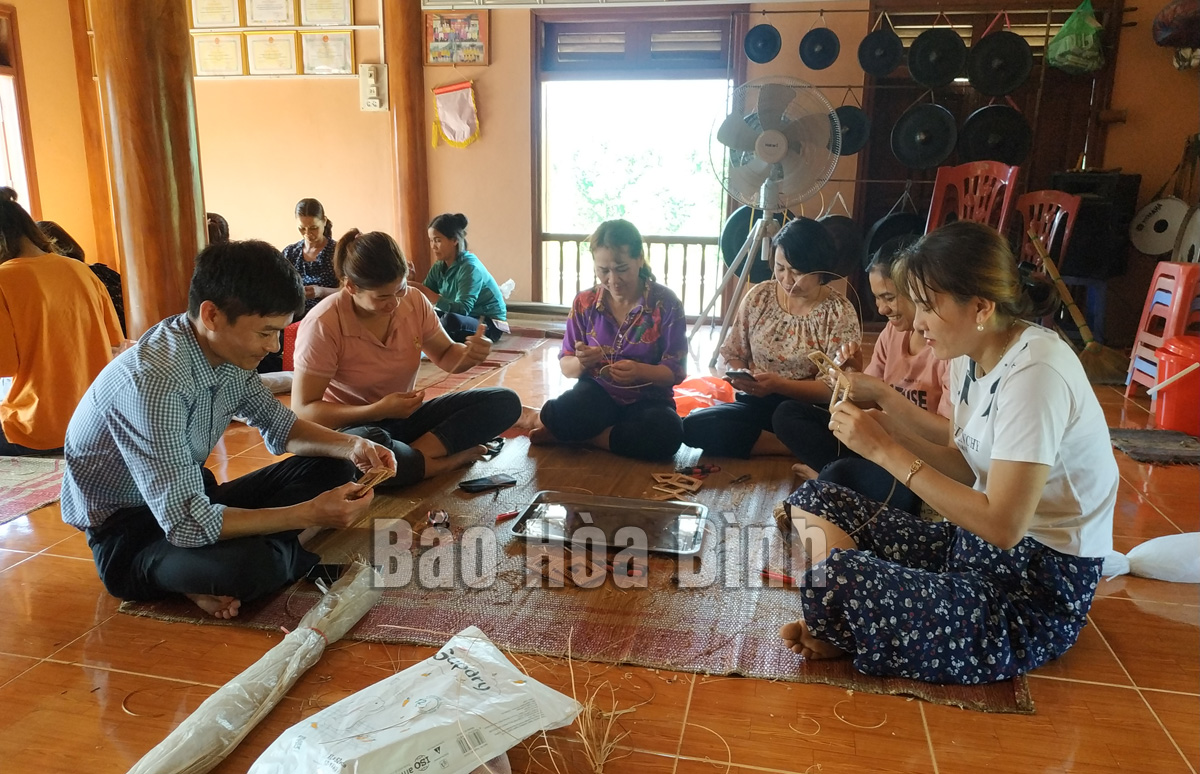
(HBO) - Providing vocational training and improving the quality of human resources is one of the policies carried out by provincial Party committees and administrations at all levels in Hoa Binh province, aiming to promote socio-economic development in ethnic minority-inhabited areas. Despite facing difficulties due to the unfavourable terrain and limited knowledge, many localities have carried out vocational training combined with job creation, bringing positive results.
A welding
class in Thong Nhat commune, Lac Thuy district.
Thong Nhat, a remote commune in Lac Thuy district, has more than 70% of its
population are ethnic minority people. It is home to five extremely disadvantaged
hamlets.
Implementing socio-economic development policies for ethnic minorities and
mountainous areas, the commune has coordinated with relevant agencies to open
many vocational training classes for rural workers. Priority has been given to
poor, disadvantaged and policy-beneficiary households. Three vocational
training classes were organised by the commune this year, attracting more than
130 labourers.
Bui Van Huan, Vice Chairman of the Thong Nhat Commune People's Committee, said
that welding and industrial sewing are selected for vocational training because
there are many enterprises that want to recruit workers with welding skills in
the locality. There are three garment factories that are in need of female
workers, thus the commune proposed the district Centre for Continuing Education
and Vocation Training to organise classes to create employment opportunities
for workers, ensuring that they will get jobs after completing their training.
Improving the quality of vocational training in association with job creation
and helping people secure a sustainable livelihood, is also the target of the
district in this regard.
Dang Thi Vy, Deputy Director of Lac Thuy district’s Centre for Continuing
Education and Vocational Training, said before opening classes, it conducted
surveys on the demand of enterprises and labourers. After collecting data, the
district coordinated with enterprises to develop plans and carry out
on-the-spot vocational training. Five classes have been organised by the centre
so far.
Da Bac district has allocated 1.4 billion VND (59,550 USD) for holding 17
training classes for ethnic minority people under the socio-economic
development project in ethnic minority-inhabited and mountainous areas for the
2021-2025 period.
Dinh Thi Nam, Head of the Division of Ethnic Minority Affairs of Da Bac
district, said that the district has many potential and advantages for tourism
development, especially community-based tourism. To improve the quality of
human resources for the development of the tourism industry, it has offered
training in such professions as tour guide, cooking, and brocade embroidery.
In line with the National Target Programme on Socio-economic Development in the
ethnic minority-inhabited and mountainous area for the 2021 – 2025 period, the
province aims to fulfill the target of about 63% of labourers of the working
age will receive proper vocational training that is suitable to their
aspirations and living conditions.
To this end, the provincial People's Committee has directed departments,
agencies and People's Committees of districts and cities to promptly develop
plans and carry out vocational training programmes for workers in the ethnic
minority-inhabited and mountainous areas.
Attention will be paid to dissemination and providing counseling for ethnic
minority people in selecting occupations that are suitable totheir
conditions and capacity.
Along with supporting costs for vocational training and changing occupations
for households and ethnic minorities, the province will continue to have
mechanisms to encourage businesses, cooperatives, and establishments to recruit
workers that have undergone training./.
Mai Chau district has firmly established itself as a standout destination on Vietnam’s tourism map, attracting both domestic and international visitors with its breathtaking landscapes, rich ethnic culture, and warm hospitality. However, beyond its natural and cultural charm, a secure and well-managed tourism environment has added to Mai Chau’s appeal.
As Vietnam enters a new phase of economic and administrative reform in 2025, Hoa Binh province is stepping up its efforts to streamline governance, boost economic growth, and attract investment.
The Hoa Binh provincial People's Committee held its monthly meeting on March 26 to review the progress of key projects, assess budget revenue and public investment disbursement, provide feedback on draft documents for submission to the provincial Party Committee's Standing Board, and discuss other important matters related to the committee's governance activities.
Playing a key role in Hoa Binh province’s economic development, Luong Son district has been focusing on science and technology development, innovation, and digital transformation.
Identifying the application of online public services as a key step in administrative procedure reform and e-government building, Kim Boi district has proactively provided services and supported residents and businesses in accessing and utilising full-process online public services promptly and efficiently. The locality aims to lift the rate of end-to-end online public services to over 90%, with all officials and civil servants handling tasks in the digital environment.
Nguyen Anh Tuyet, hailing from a family steeped in the ancient art of herbal medicine, is transforming local medicinal herbs into high-value concentrated extracts, elevating their worth and healing potential.



